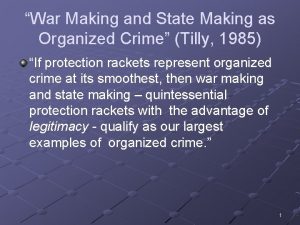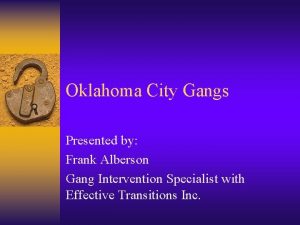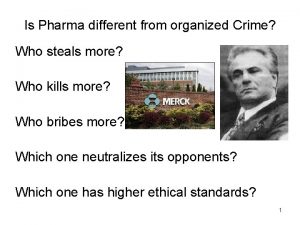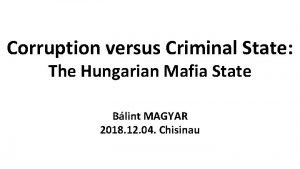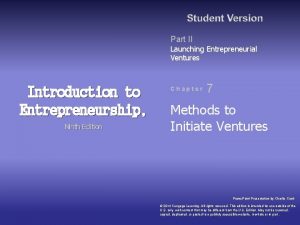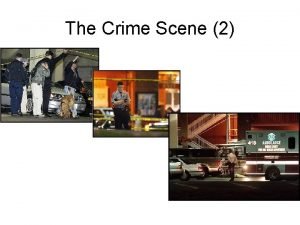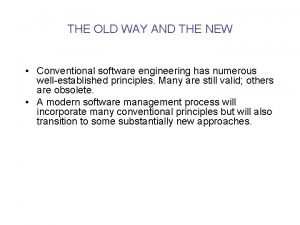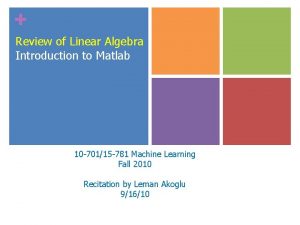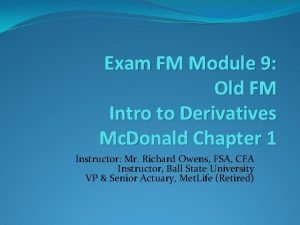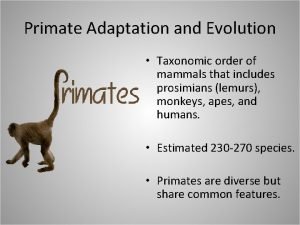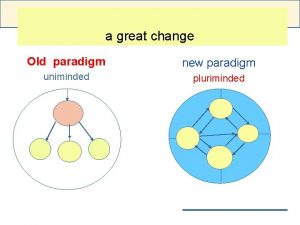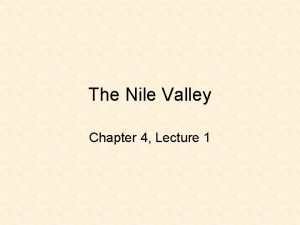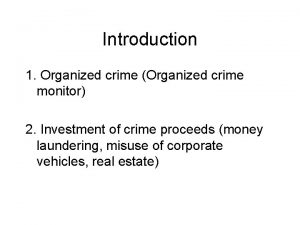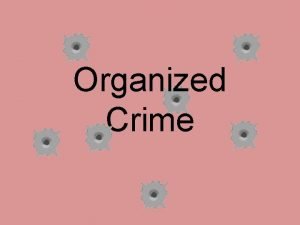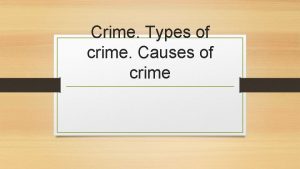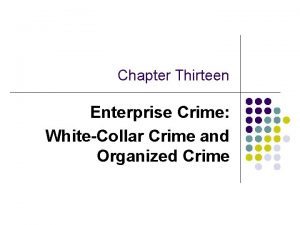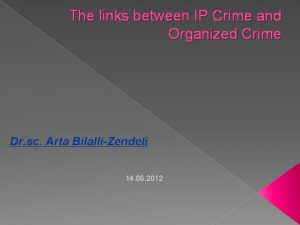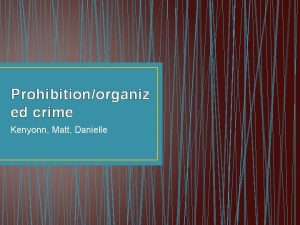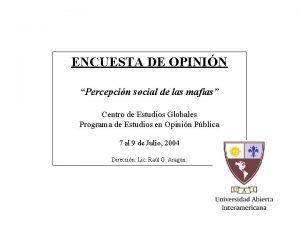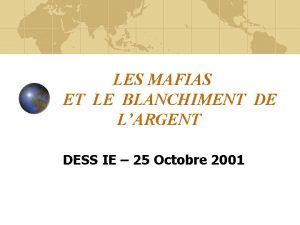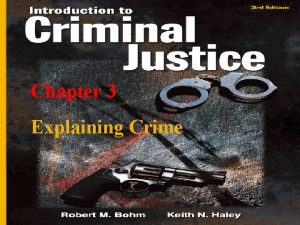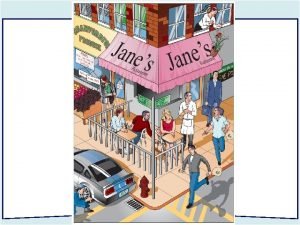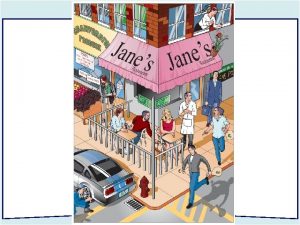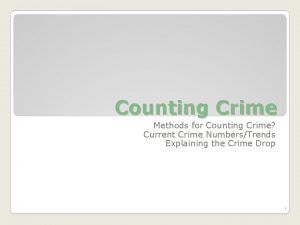PART II Organized Crime Mafias Old and New


































- Slides: 34

PART II: Organized Crime Mafias, Old and New

Today: Durkheim: criminality is all about norms and sanctions. Crime and punishment are central to our conscience collective. Functionalist approach to crime. Punitive vs. Restitutive sanctioning.

Patrimonialism is a form of traditional political domination in which a royal household exercises arbitrary power through a bureaucratic apparatus. In such a system, administration and coercive force are under the direct, personal control of the ruler. We might think of mafias as anachronistic patrimonial models in today’s nonpatrimonial systems. PATRON CLIENT, etc. (see Albanese, p. 130). Barrier to free market capitalist institutions as we know them, but also has certain advantages over rationalized organizations: * Speed, Efficiency, Adaptiveness. * Private interest, individual motivation: space for personality. * Strong sense of tradition and ethnic belonging. * Visible and attractive model of success.

Norms and Sanctions in Client-Patron Social Orders As you think about Durkheimian issues of norms and sanctions, consider them at three levels: At the level of mafias themselves …e. g. the norms of silence and the sanctions of murder. At the level of state-organized crime (i. e. mafia and law -enforcement) relations …e. g. the norms of law and the sanctions of incarceration. At the level of social scientists and other observers analyzing organized crime …e. g. the judgements and interests of this class, media accounts, even film.

Morality and other Social Facts • • • Social facts are things because they are outside us - they are a given, pre-existing condition for human agency and they cannot be known by introspection, by reflection. The human agency that produced the social facts we confront is not ours; it was exercised in the past, by collective agents pursuing collective, not individual goals. Social facts are external to all individuals now living; they are given, the context or condition for thinking and action; they are constraining upon individuals because they pressure individuals to act in established, predictable ways. Collectivity approves of individual actions = norms Collectivity disapproves of individual actions = sanctions • The existence and expectation of sanctions operates to generate similar patterns of individual reasoning and thinking; it introduces social elements into individual mental processes and transform us into social beings. Criminality, ultimately, is about those social facts that regulate violations of norms and the resulting sanctions.

How do we identify social facts? The nonmaterial nature of most social facts raises the problem of identification. Durkheim indicates that we can identify social facts by establishing whether or not they are sanctioned. If the context within which individuals act takes notice of whether or not individuals behave in established ways, following institutional injunctions, and rewards or punishes according to whether or not individuals are compliant, then we can be sure that we have identified a social fact. • Sanctions can be formal (e. g. , law) or informal (e. g. , social control, shaming, exclusion, etc. ).

Durkheim’s “functionalist” approach to crime and penal sanctions Durkheim’s approach is characterized by three chief arguments towards a self-conscious strategy of empirical reference: • (1) The distinctive realm of social facts. • (2) Treat those social facts as things, external to us. • (3) Be careful to distinguish between “causes” and “functions” (consequences). The most significant social facts are collective representations: these are collective ways of acting and thinking, noticeable by the fact that they are sanctioned. Society, in other words, makes arrangements for the eventuality that they are not complied with or respected.

Is Organized Crime Functional? Part of our fascination is surely attributable to the forging of collective morality that organized crime affords us: we are united in our condemnation of mafia tactics. Our collective representations, as it were, are strengthened and clarified by our shared normative condemnation of organized criminals. This not only makes us feel moral, but (more importantly, Durkheim would argue) makes us feel part of a moral community.

The most important collective representation: The “Conscience collective”

Society as a Moral Reality • Society’s continuing existence and welfare depend on the willingness of individuals to consider each other not as instruments, but as fellow beings equally entitled to respect and solidarity. Society is the source of morality. • Society demands not just on obedience but devotion. • According to Durkheim, all institutions, mundane as their themes may be, have arisen as articulations and differentiations of a single great institutional matrix: religion. It is religion that tells us the sacred from the profane, and continuously validates constraints on us as legitimate. • For instance, a tribe worshiping a totem actually worships itself. It is the manifestation of the superiority, powerfulness, generosity of the group that generates in its members the experience of the sacred – an experience which myth and ritual continuously revisit and reproduce.

Division of Labor Division and specialization of labor was, for Durkheim and contemporaries, the most significant feature of modernity. Durkheim subscribed to the Social Darwinist view that division of labor is the human variant of a universal biological process: the progression from simple forms of life to differentiated, complex ones. However, he rejected utilitarian explanations which emphasized individual self-interest as the motor behind efficient, self-interested ways of organizing labor.

Crime in the Old Days… Durkheim believed that early societies were constituted by the ways they respond to violations of norms. Such responses took the form of punitive sanctions, of inflictions of pain on the violators by, or in the name of, the whole society, in order to reassert universally shared and inflexible understandings. More generally, Durkheim’s emphasis on norms (as opposed to, say, “contracts”) invites us to move beyond the legalistic, psychological, and “formal rational” explanations

“Mechanical Solidarity”: Repressive, penal punishment These early societies followed a “morphological pattern”: Small population + low demographic density + large territory + use of primitive technology to extract resources = “Mechanical Solidarity” Such societies get segmented into even smaller, very similar subunits which subsist by embodying the same culture and interacting with the others on ritual occasions, which renew everyone’s feeling of “togetherness. ” These societies are homogenous and have no major fissures to be mended.

“Organic Solidarity”: Restitutive Punishment The equilibrium of such a society, according to Durkheim, eventually gets disturbed: Increase in population + increase in demographic density increased competitive pressure over resources. At this juncture, the society in question either falls prey to strife and disorder or it spontaneously embarks on sustained change by dividing labor. Many generations later, we are left with a profoundly different picture: Large population operating over large territory making intensive use of resources + a differentiation process forces development of different skills and technologies + diverse beliefs, norms, customs guide people within their differentiated branches = “Organic Solidarity” In this situation, violation of the norms does not evoke the wrath of the whole society. Rather, sanctions are typically not punitive but “restitutive” – they seek to remedy the damage the violation has done to the interests of given individuals, and only if those request such remedy. Normative bonds of society as a whole become fewer, and “looser, ” so mechanical solidarity is no longer possible. The “glue” that keeps society together is now due to the fact that the different parts interact with, and deliver goods and services to, one another. Think of advanced biological species, which present organs which are diverse in structure and operation but all serve the needs of each other and of the whole.


Myths, begone! • Myth #1: Mafias are centralized, hierarchical organizations. – In fact, they have been diffuse and disorganized, with almost incessant internal conflict. • Myth #2: They are absolutely secretive. – In fact, they thrive on publicity (particularly of violence). • Myth #3: They are “global, ” seemingly everywhere. – In fact, they are localized, their autonomy restricted to very particular cities and neighborhoods. • Myth #4: They are stronger than the government. – In fact, they only strive insofar as their services are unoffered by the state and noncriminal civil society.

Org. Crime today… “’Mafia then is not an organization. It is a system of patron-client relationships that interweaves legitimate and illegitimate segments of Sicilian society. ‘Mafioso’ is not a rank or position within a secret organization. Rather it represents a type of position within the patron-client relationship of Sicilian society itself” (Albanese, p. 130).


The state “creates” mafias “Prohibition is probably more responsible than any single event for the emergence of strong organized crime groups” (Albanese p. 135).



New Mafias emerge when… • …there is a sudden or late transition to market economy. • …the legal structure for property rights and regulation of business disputes is unreliable. • …a bunch of people who are trained in violence are suddenly unemployed.

New Mafias: Global Crime Inc. ? • Conventional wisdom: globalization and population migration has given rise to highly mobile, transnational, multi-ethnic and flexible organized criminal networks. Unattached to specific territories, they are akin to multinational firms. • New market openings, quick access to materials and labor: » » Sicilian mafia in Germany Columbian mafia in Galicia Chinese mafia in Netherlands Russian mafia in Hungary But is de-territorialization as extensive as all that?

Varese: It Ain’t So! • Mafias are rather stationary, and their power bases and enterprises are primarily local. This is because of three reasons: (1) Ability to monitor agents. (2) Information collection and communication. (3) Reputation.

Verese’s Transplantation vs. Illegal Trade/Smuggling

Mafias not as “free-floating” as they seem For the most part, “mafiosi find themselves in the new locale not of their own volition; they have been forced to move there by court orders, to escape justice or mafia infighting and wars […] They are making the most out of bad luck” (Varese, p. 8).

Fertile Ground for Transplantation Demand for criminal protection locally. Large illegal markets booming (particularly suddenly). Export-oriented economy. Weak, untrustworthy state protection. No other mafia group should be present. Competitors are weak or otherwise preoccupied. State should be inexperienced in cracking down. Dispute-resolution and negotiation in civil society is non-criminalized, vulnerable to co-optation.

Above all, transplantations require a delicate balance between: - Remaining inconspicuous enough abroad, in the alien culture into which they are transplanted, to avoid transparency and lawenforcement; and - Remaining credible enough for people to take their coercive capacity seriously and to know that they are the “go-to” private protection service. This balancing act is no small task, especially considering the fact that (in most cases) mafiosi are exiled to their new environments.



Damned if you do, damned if you don’t The state pursuing repression of mafias is faced with a number of dilemmas: • For all their faults, mafias “ensure a degree of order and predictability” in illegal markets (Varese, p. 197). Disrupting these can cause tremendous harm to the population: e. g. the U. S. crack epidemic of 1980 s. • Mafias tend not to respond to crackdowns lightly; at best, they migrate, shifting the problem from one region to another: e. g. the problem of displacement and transplantation. At worst, they cause wars: e. g. Albanian organized crime in Macedonia. • Mafias are embedded in vast networks of client-patron relationships; uprooting mafias may mean uprooting the very fiber of these communities, causing tremendous disruption: e. g. post-Soviet Georgia.

Victim-sanctioned human smuggling = trafficking? State-sanctioned trafficking = migration? Further difficulties arise because the coercive and “unjust” components of organized criminal services are often unclear and ambivalent. - Are we looking at victims or clients? Who is forcing whom? - Is the state instrumentalizing the mafia or vice-versa? Who is being duped? - Where is the line between entrepreneur extraordinaire and criminal mastermind? Chinese migrants in Belgrade Chinatown | Kosovar migrants on their way to EU

Democracy and Mafias Varese’s “paradoxes of democracy” are in fact understated: there is a clear, well-documented correlation between democratization, liberalization and the growth of civil society / shrinking of the state on the one hand the ascension, growth and institutionalization of mafias on the other. Democratic institutions take decades (if not centuries) to solidify. In the meantime, they tend to be overlaid (often in a hasty, Western-biased “copypaste” manner) on top of extant communal and tribal patronage networks. And who better to manage patronage networks than mafias? They are proven, trusted and experienced providers of protection, goods, services, justice and social order.

“Old Mafias” “New Mafias” Conscience Collective (Internally) High. Weaker. Societal norms (external) regulating mafias Perfectly sympathetic, accepting, non-judgmental (mafias considered normal) Censorious, exclusionary, highly judgmental (mafias considered abnormal) Ethnic particularism. Absolute. Partial. Solidarity (within) Mechanical. Organic. Analogous social forms Despotic, patrimonial state; patriarchal family. Multinational firm; semibureaucratized patron-client networks. Sanctioning (internal) Punitive, repressive. Preventive, restitutive. Sanctioning (by states) Traditional crackdowns by individual governments. Regional, international lawenforcement (mostly of borders). Transplantations None. Reluctant, difficult, rare. Effect of Democratization Threatening. Potentially promotional, empowering.
 War making and state making as organized crime summary
War making and state making as organized crime summary Gbc gang
Gbc gang Organized crime osrs
Organized crime osrs Hungarian organized crime
Hungarian organized crime New-old approach to creating new ventures
New-old approach to creating new ventures Njbta
Njbta Old crime scene
Old crime scene Once upon a time there lived a man
Once upon a time there lived a man Once upon a time there lived an old man and an old woman
Once upon a time there lived an old man and an old woman Whats your name how old are you
Whats your name how old are you Once upon a time there lived an old woman this old woman
Once upon a time there lived an old woman this old woman Difference between old covenant and new covenant
Difference between old covenant and new covenant Conventional software
Conventional software Old man and new man
Old man and new man Old concept of marketing
Old concept of marketing Linear independence of vectors
Linear independence of vectors Module 9 old and new
Module 9 old and new Old imperialism vs. new imperialism
Old imperialism vs. new imperialism The old and young prophet
The old and young prophet Sinai bible
Sinai bible Japan food guide pyramid
Japan food guide pyramid Symbols the great gatsby
Symbols the great gatsby Old lights vs new lights
Old lights vs new lights New imperialism motives
New imperialism motives Old world monkey vs new world monkey
Old world monkey vs new world monkey Old paradigm vs new paradigm examples
Old paradigm vs new paradigm examples Ada story
Ada story Pumpkin new world or old world
Pumpkin new world or old world Matthew mark luke john old testament
Matthew mark luke john old testament Food science an old but new subject
Food science an old but new subject Old south vs new south streetcar named desire
Old south vs new south streetcar named desire Is titus in the old or new testament
Is titus in the old or new testament Old kingdom middle kingdom new kingdom
Old kingdom middle kingdom new kingdom Nnn ruled
Nnn ruled Everyone dancing merrily in the new old fashioned way
Everyone dancing merrily in the new old fashioned way
